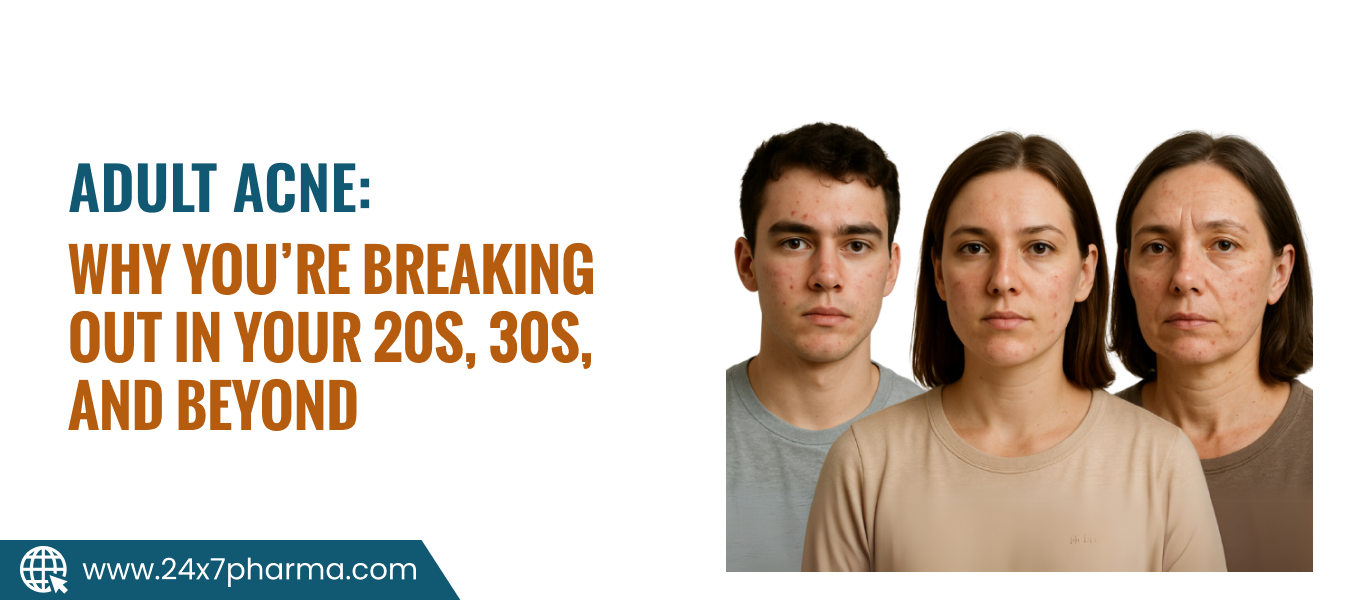Why Adults Get Acne: It’s More Than Just Hormones
While hormonal changes are a major factor, adult acne is often the result of multiple overlapping issues:
Hormonal Fluctuations in Adulthood
Why Do Women Get Acne Around Their Period or Menopause?
Hormones like estrogen and progesterone rise and fall throughout a woman’s life. Events like menstruation, stopping or starting birth control, pregnancy, or perimenopause can cause oil glands to overproduce sebum. This leads to clogged pores—especially along the chin and jawline.
Chronic Stress = Chronic Breakouts
Cortisol, your body’s primary stress hormone, triggers oil production and inflammation. It can even disrupt your hormonal balance. Over time, chronic stress can worsen breakouts and make acne more difficult to treat.
Are Your Products Causing Pimples?
What Are Comedogenic Ingredients to Avoid?
Skincare and haircare products may be doing more harm than good. Ingredients like coconut oil, lanolin, and heavy silicones clog pores—especially in adults with more sensitive skin barriers.
TIP: Look for non-comedogenic, fragrance-free, and oil-free formulas. Avoid “clean beauty” hype if the formulation lacks proper testing.
Diet & Gut Health Influence Adult Acne
Is Dairy and Sugar Causing My Breakouts?
Emerging research suggests that high-glycemic foods (like white bread and soda) and dairy may spike insulin, leading to excess oil production and inflammation. Some people also find relief by reducing whey protein, cow’s milk, and processed snacks.
Underlying Health Conditions to Rule Out
If you have persistent, painful cystic acne as an adult, it may be linked to:
- Polycystic Ovary Syndrome (PCOS)
- Thyroid dysfunction
- Insulin resistance
- Gut microbiome imbalance
Consult a dermatologist or endocrinologist to rule out these conditions if OTC treatments aren’t working.
Environmental & Lifestyle Factors
- Air pollution increases free radical damage and clogs pores
- Face masks (a.k.a. “maskne”) trap oil and bacteria
- Humidity and sweat contribute to breakouts if skin isn’t cleansed properly
Breakouts by Age Group
Acne in Your 20s
Your 20s are full of transitions—college, first jobs, hormonal shifts. Common acne triggers in your 20s include:
- Stopping or switching birth control
- Lack of sleep and high stress
- Poor diet (high-sugar, processed foods)
- Inconsistent or harsh skincare routines
- Frequent travel disrupting skincare habits
Acne in Your 30s
In your 30s, skin cell turnover slows and stress often increases. Common causes include:
- Using anti-aging products that clog pores
- Hormonal fluctuations due to pregnancy or fertility treatments
- Dehydrated skin triggering oil overproduction
- Environmental exposure (pollution, blue light, climate)
Acne in Your 40s & Beyond
Also called perimenopausal acne, this type of breakout is largely hormonal. As estrogen levels decline and androgens rise, oil glands become more active. You may notice:
- Deep, painful cysts on the jawline or cheeks
- Increased sensitivity or dryness
- Slower healing and more post-acne pigmentation
Top Treatment Options for Adult Acne
Over-the-Counter (OTC) Skincare
Look for:
- Salicylic Acid: Clears pores, great for oily skin
- Benzoyl Peroxide: Kills acne-causing bacteria
- Niacinamide: Calms inflammation and reduces redness
- Azelaic Acid: Fades acne marks and has anti-bacterial properties
Prescription Treatments
Talk to your dermatologist about:
- Retinoids (Tretinoin, Adapalene): Speed up cell turnover and reduce pore blockages
- Oral Antibiotics: For inflammatory acne
- Birth Control Pills: Especially if breakouts are tied to menstrual cycles
- Spironolactone: A hormonal acne treatment that blocks androgens in women
Holistic & Natural Remedies
How to Treat Hormonal Acne Naturally at Home
- Spearmint tea: Can reduce testosterone levels
- Zinc: Anti-inflammatory and supports skin healing
- Probiotics: Improves gut-skin connection
- Avoid sugar, dairy, and gluten (for some individuals)
In-Office Dermatology Procedures
- LED Light Therapy: Blue light kills bacteria; red light reduces inflammation
- Chemical Peels: Help with exfoliation, tone, and acne scars
- Laser Treatments: For deep cystic acne or post-acne hyperpigmentation
Best Skincare Routine for Adult Acne
Step-by-step:
- Cleanser: Gel or foaming cleanser with salicylic acid
- Toner: Alcohol-free, soothing formula (optional)
- Serum: Niacinamide or azelaic acid
- Moisturizer: Lightweight, non-comedogenic with ceramides
- Sunscreen: Zinc oxide or hybrid formula (daily use)
Avoid over-exfoliating or layering too many active ingredients. Stick to a consistent routine for at least 6–8 weeks.
How to Prevent Adult Acne Long-Term
- Wash pillowcases weekly
- Avoid touching your face
- Manage stress with mindfulness, exercise, or journaling
- Limit dairy and refined sugars
- Keep makeup tools and phone screens clean
- Remove makeup before bed — always!
People Also Ask (FAQs)
-
Why am I still getting acne in my 30s?
Hormonal fluctuations, stress, and slower skin renewal in your 30s contribute to adult acne. Using rich anti-aging creams that clog pores can also worsen breakouts.
-
What is the best treatment for adult acne?
Combination therapy often works best: retinoids, hormonal treatments like spironolactone, and lifestyle changes including a clean diet and stress management.
-
Why is my acne on my jawline?
Breakouts on the jawline and chin are strongly linked to hormonal imbalances. This is particularly common in women during menstruation, perimenopause, or with PCOS.
-
Is adult acne different from teenage acne?
Yes. Adult acne is typically more inflammatory, more persistent, and often located on the lower face. Teen acne tends to be more oily and on the T-zone.
Conclusion
Adult acne isn’t just a skin issue—it’s an emotional one too. But whether you’re in your 20s, 30s, or 40s, understanding what’s driving your breakouts can help you regain control. With the right combination of skincare, lifestyle changes, and medical support, achieving clear, healthy skin is completely possible.
Want to go deeper? See our in-depth guide on The Truth About Hormonal Acne: Causes and Best Treatments

